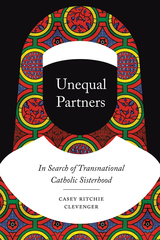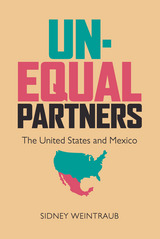2 books about Unequal Partners

Unequal Partners
In Search of Transnational Catholic Sisterhood
Casey Ritchie Clevenger
University of Chicago Press, 2020
When we think of Catholicism, we think of Europe and the United States as the seats of its power. But while much of Catholicism remains headquartered in the West, the Church’s center of gravity has shifted to Africa, Latin America, and developing Asia. Focused on the transnational Sisters of Notre Dame de Namur, Unequal Partners explores the ways gender, race, economic inequality, and colonial history play out in religious organizations, revealing how their members are constantly negotiating and reworking the frameworks within which they operate.
Taking us from Belgium and the United States to the Democratic Republic of the Congo, sociologist Casey Clevenger offers rare insight into how the sisters of this order work across national boundaries, shedding light on the complex relationships among individuals, social groups, and formal organizations. Throughout, Clevenger skillfully weaves the sisters’ own voices into her narrative, helping us understand how the order has remained whole over time. A thoughtful analysis of the ties that bind—and divide—the sisters, Unequal Partners is a rich look at transnationalism’s ongoing impact on Catholicism.
Taking us from Belgium and the United States to the Democratic Republic of the Congo, sociologist Casey Clevenger offers rare insight into how the sisters of this order work across national boundaries, shedding light on the complex relationships among individuals, social groups, and formal organizations. Throughout, Clevenger skillfully weaves the sisters’ own voices into her narrative, helping us understand how the order has remained whole over time. A thoughtful analysis of the ties that bind—and divide—the sisters, Unequal Partners is a rich look at transnationalism’s ongoing impact on Catholicism.
[more]

Unequal Partners
The United States and Mexico
Sidney Weintraub
University of Pittsburgh Press, 2010
Since Mexico’s defeat in the Mexican-American War of the 1840s, the United States has continued to dominate Mexico economically, militarily, and politically. This long history of asymmetry has created a Mexican distaste for “American arrogance,” and an American vision of Mexico as its “backyard.” The imbalance has damaged political negotiations, trade pacts, and capital flows, as suspicions and protectionism have undermined diplomacy. Despite these events, the two nations remain joined at the hip: more than 80 percent of Mexico’s exports are to the United States, and the majority of foreign investment in Mexico comes from America.
In Unequal Partners, Sidney Weintraubexamines the current relationship of Mexico and the United States as one of sustained dependence and dominance. The chapters examine the consequences of this imbalance in six major policy areas: trade; investment and finance; narcotics; energy; migration; and the border. The book begins in 1954 when the Mexican “growth miracle” was at its apex, and proceeds to the present. Special attention is paid to the post-1982 debt crisis era, when Mexico began a more outward-looking trade policy.
As this study reveals, Mexico has often been its own worst enemy in foreign relations. Over the past thirty years, the country has been plagued by debt, currency fluctuations, tax collection problems, political corruption, and state-controlled business monopolies that block foreign investment and importation. These factors have created an environment of instability, damaged outside perceptions, and weakened Mexico’s bargaining position.
Weintraub considers future policy changes that would help Mexico to level the playing field. Improving the education system, he argues, will benefit nearly every other activity and institution, and opening the oil market to private investment and technology will help develop deep-water drilling and revitalize this significant export commodity. In foreign relations, Mexico must be assertive—as it has been in easing U.S. restrictions on goods traded through NAFTA, and demanding U.S. aid to fight drug cartels—not passive, as it currently is on U.S. anti-immigration policy and the proposed border wall. Perhaps most importantly, the study points to the deeper development of policies that are proactive and outward looking.
In Unequal Partners, Sidney Weintraubexamines the current relationship of Mexico and the United States as one of sustained dependence and dominance. The chapters examine the consequences of this imbalance in six major policy areas: trade; investment and finance; narcotics; energy; migration; and the border. The book begins in 1954 when the Mexican “growth miracle” was at its apex, and proceeds to the present. Special attention is paid to the post-1982 debt crisis era, when Mexico began a more outward-looking trade policy.
As this study reveals, Mexico has often been its own worst enemy in foreign relations. Over the past thirty years, the country has been plagued by debt, currency fluctuations, tax collection problems, political corruption, and state-controlled business monopolies that block foreign investment and importation. These factors have created an environment of instability, damaged outside perceptions, and weakened Mexico’s bargaining position.
Weintraub considers future policy changes that would help Mexico to level the playing field. Improving the education system, he argues, will benefit nearly every other activity and institution, and opening the oil market to private investment and technology will help develop deep-water drilling and revitalize this significant export commodity. In foreign relations, Mexico must be assertive—as it has been in easing U.S. restrictions on goods traded through NAFTA, and demanding U.S. aid to fight drug cartels—not passive, as it currently is on U.S. anti-immigration policy and the proposed border wall. Perhaps most importantly, the study points to the deeper development of policies that are proactive and outward looking.
[more]
READERS
Browse our collection.
PUBLISHERS
See BiblioVault's publisher services.
STUDENT SERVICES
Files for college accessibility offices.
UChicago Accessibility Resources
home | accessibility | search | about | contact us
BiblioVault ® 2001 - 2024
The University of Chicago Press









